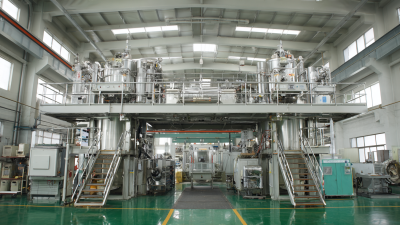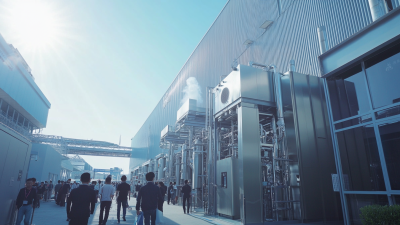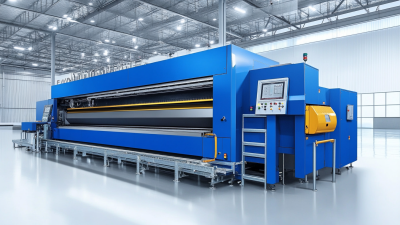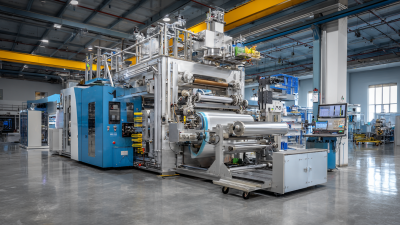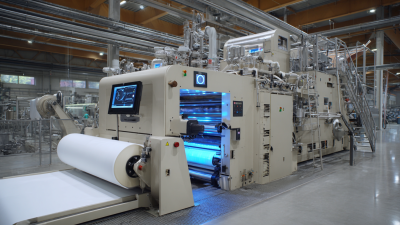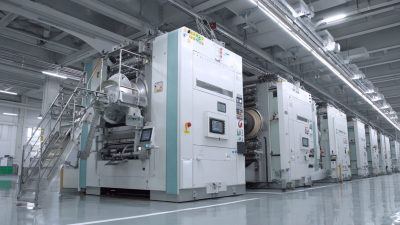
In today's competitive manufacturing landscape, the efficiency of production processes is paramount, particularly in the realm of pharmaceuticals and food technologies. A recent industry report highlights that optimizing production efficiency can boost output by as much as 30%, directly impacting profitability. One of the key tools in achieving this enhancement is the film coating machine, which not only improves product appearance and taste but also provides an essential barrier against moisture, oxygen, and contamination.

The global film coating market is projected to reach USD 5.2 billion by 2026, growing at a CAGR of 5.7%, underscoring the increasing reliance on advanced coating solutions. In this blog, we will explore the seven best film coating machines that promise to elevate your production efficiency, offering insights into their features and advantages that can transform your manufacturing capabilities.
When choosing a high-quality film coating machine, several key features should be at the top of your list to ensure optimum performance and efficiency in your production line. Firstly, consider the coating speed and precision. A machine that offers adjustable speed settings allows for versatility based on different production requirements, while precision engineering ensures consistent and uniform coating, reducing waste and enhancing product quality.
Another important feature is the ease of operation and maintenance. Look for machines with user-friendly interfaces and programmable settings, as this will simplify the training process for your operators and enhance productivity. Additionally, advanced cleaning systems can reduce downtime between batches, allowing for quicker transitions and less interruption in production. Finally, consider the flexibility in coating materials that a machine can accommodate, as the ability to use various polymers or solvents can broaden your product offerings and adapt to market trends.
Film coating machines play a crucial role in enhancing production efficiency across various industries, particularly in pharmaceuticals, food, and electronics. According to a report by Grand View Research, the global film coating market was valued at approximately $2.8 billion in 2022 and is projected to expand at a CAGR of around 6.5% from 2023 to 2030. This growth is indicative of the increasing demand for advanced coating solutions that improve product quality and shelf life, while also optimizing production processes.
In pharmaceuticals, for example, film coating machines enable the production of tablets with controlled-release characteristics, which enhance patient compliance and therapeutic effectiveness. Research published in the Journal of Pharmaceutical Sciences shows that effective coating can reduce the dissolution time of active ingredients by up to 50%, thereby maximizing the efficiency of the production line. In the food industry, the use of film coatings can protect against moisture and oxygen, extending product shelf life, while reducing waste. This dual focus on quality improvement and operational efficiency is driving the adoption of film coating technology, making it an essential investment for manufacturers looking to stay competitive in the market.
When considering the best film coating machines for your production line, it's essential to weigh the advantages and disadvantages of manual versus automated options. Manual film coating machines often provide a lower initial investment and greater flexibility for small-scale operations. They allow operators to have a hands-on approach, offering more control over the coating process. However, this level of control can also lead to inconsistencies and increased labor costs, as skilled operators are needed to maintain quality across batches.
On the other hand, automated film coating machines excel in efficiency and consistency, particularly in high-volume production scenarios. With programmable settings and real-time monitoring, these machines reduce the potential for human error and strengthen product uniformity. While the upfront costs for automation are typically higher, the long-term savings in labor and enhanced productivity can make them a worthwhile investment. Businesses must evaluate their specific production needs and capacity to determine whether the precision of automation outweighs the adaptability of manual systems.
The film coating industry is undergoing significant transformation as emerging technologies redefine production processes and enhance efficiency. According to a report by MarketsandMarkets, the global film coating market is projected to reach USD 3.91 billion by 2025, growing at a CAGR of 6.3%. This surge is largely attributed to advancements in coating formulations and machinery that enable better adhesion and durability while reducing environmental impact. Automated and precision-driven film coating machines are at the forefront of this evolution, allowing manufacturers to achieve higher productivity levels and consistency in product quality.
Furthermore, the integration of smart technologies, such as IoT and AI, is revolutionizing film coating applications. These technologies facilitate real-time monitoring and quality control, ensuring that production processes remain efficient and error-free. A study by Grand View Research indicates that the increasing adoption of AI-driven solutions in the manufacturing sector could lead to a potential increase in operational efficiency by up to 30%. As industries across sectors, from pharmaceuticals to electronics, begin to adopt these innovations, the future of film coating machinery promises enhanced capabilities that will not only elevate production efficiency but also significantly reduce waste and operational costs.
Investing in film coating machines is a strategic move for businesses aiming to enhance their production efficiency. These machines not only streamline the coating process but also significantly reduce labor costs and material waste. By automating tasks that were once performed manually, companies can achieve consistency in coating quality, leading to better product performance and customer satisfaction. Evaluating the cost-benefit ratio becomes crucial; while the initial investment may seem high, the long-term savings and productivity gains often outweigh the costs.
Furthermore, modern film coating machines come equipped with advanced technology that allows for greater customization and faster turnaround times. Businesses can benefit from shorter lead times and improved flexibility in production schedules, making it easier to respond to market demands. As a result, the ability to produce high-quality coated products efficiently paves the way for increased competitiveness in the market. Hence, when evaluating film coating machines, it is essential to consider not just the purchase price, but also how they can ultimately enhance operational efficiency and contribute to overall business growth.
| Machine Model | Production Capacity (units/hour) | Average Cost ($) | Energy Consumption (kWh) | Return on Investment (ROI) |
|---|---|---|---|---|
| Model A | 150 | 25,000 | 5.0 | 150% |
| Model B | 200 | 30,000 | 6.5 | 175% |
| Model C | 180 | 28,000 | 5.8 | 160% |
| Model D | 210 | 32,000 | 7.0 | 200% |
| Model E | 170 | 27,000 | 5.2 | 155% |
| Model F | 220 | 35,000 | 8.0 | 210% |
| Model G | 190 | 29,000 | 6.0 | 165% |
